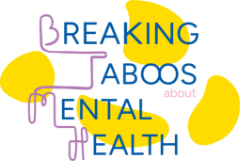Ketevani Japharashvili is a charming, calm, and artistic, 22-year-old young lady that came from Sakartvelo to become a Volunteer in Druskininkai Youth Activity Centre. She was very open from the beginning about her mental health issue and wanted to advocate for it and spread awareness for people to know more about it.
So, what is cyclothymia? It is known as a mild form of bipolar disorder. (Cyclothymia is also sometimes referred to as bipolar III, but this isn’t its official diagnostic name.) It is milder than bipolar I or bipolar II in that the depressive and hypomanic episodes are not as intense as those found in the other two disorders. In between the highs and lows, people with cyclothymia may feel normal. However, it’s important to get help for this condition since it can significantly impact everyday functioning and affect relationships at home and at work.
Dear Keti, could you describe your experience living with cyclothymic disorder? What are some of the main symptoms and challenges you face daily?
With cyclothymic disorder, I experience extreme mood swings, fluctuations between high and low moods over nonspecific periods of time. For me challenge lies in its unpredictable nature; I never know how I’ll feel in the next two hours, for example.
What would you like people to know about this mental health issue?
It’s crucial to understand that cyclothymic disorder isn’t just about ordinary ‘mood swings,’ and someone experiencing it isn’t simply a ‘moody person.’ Even short episodes lasting just a few hours can be significantly more intense and challenging than typical good and bad moods.
How would you simply describe the disorder using simple words or examples to everyone to get the main idea of what it is?
I would like to provide this visual interpretation that captures the symptoms well.

How did you first become aware that something might be different about your mental health, and what led to your diagnosis of cyclothymic disorder?
It’s actually quite interesting that even while struggling with depression, I couldn’t fully grasp that something was off until I experienced a significant gap between moods. One day, I found myself battling with resisting suicidal thoughts, and the next, I couldn’t stop dancing in the streets. It became obvious to me that something wasn’t quite normal. As I began to research, it became clear that typical bipolar disorder (both type I and II) didn’t quite match my experiences, yet I still felt far from ‘normal.’ It was my curiosity and discomfort with the uncertainty that ultimately led me to see a doctor, rather than a feeling of needing assistance.
Could you share how your diagnosis of cyclothymic disorder has impacted your life personally? How have you adapted to managing your symptoms and maintaining stability?
The reason I always talk openly about this topic is that knowing my diagnosis significantly changed my life. To break free from those heavy chains, you first need to recognise that you are chained and understand the type of chains holding you down. It felt better to know what I have.
It makes a difference when you can identify symptoms as just that symptoms and not natural thoughts.
Living with cyclothymic disorder often involves cycling between periods of hypomania and mild depression. How do these mood shifts affect your relationships, school, and overall quality of life?
Even though I can’t say that it has affected any of my relationships, it sometimes feels impossible to maintain a high quality of work in my studies. During episodes, it takes so much effort just to bear through it, and afterwards, gathering myself back together becomes a challenge. Finding the energy or time to focus on studying becomes incredibly difficult during these periods.
Many people with cyclothymic disorder find it challenging to maintain consistent routines and manage their energy levels. How do you cope with these fluctuations and prioritise self-care during different phases of your mood cycle?
First of all, I believe it’s important to self-analyse and observe your mood changes, symptoms, reactions, and so on. Personally, I’ve learned how crucial it is not to push myself when I feel overwhelmed, and sometimes stepping out of my comfort zone can be harmful.
Volunteering can be a meaningful way to engage with others and contribute to the community. Have you found volunteering to be beneficial in managing your cyclothymic disorder? If so, how has it positively impacted your mental health and sense of purpose?
I always say that volunteering is an opportunity for me to temporarily set aside the chaos of everyday life, take a breath, and focus on self-development. Naturally, it’s beneficial for my mental health as well. Moreover, it’s the place where I can fully take care of my mental health, something that unfortunately isn’t always possible in my regular life.
Has your experience with cyclothymic disorder influenced your perspective on mental health advocacy or awareness? If yes, in what ways do you advocate for yourself and others living with similar conditions?
It’s difficult to articulate how the world changes before and after taking care of a disorder. I always try to explain it to people who seem to need help, but I realise that much of what I say may not resonate with them and I can’t blame them – It’s hard to understand in darkness that there’s light somewhere. I just want everyone to know that having suicidal thoughts, waking up without the will to live, is not normal, and it’s not your fate either. Everything can change, and I can guarantee that you’ll be really surprised when you feel the light and see the darkness from afar.
And I’ll add that you don’t need to be on the edge of ending your life to think that you need help. If you feel even slightly bothered, just take it easy and make an appointment. It won’t harm you. But ignoring your situation can.
Seeking support from mental health professionals and building a strong support network can be crucial for individuals managing cyclothymic disorder. How have therapy, medication, and other tools helped you in your journey?
For me, medication has reduced my symptoms to the point where they are usually easy to manage. It has made them less frequent and less intense, and I genuinely think that I would fall without it.
What advice would you offer to others who have recently been diagnosed with cyclothymic disorder or are struggling to manage their mental health challenges? Are there any strategies or resources that have been particularly helpful for you?
Observe yourself and take care of it. There is nothing else I can tell.
What are most common stereotypes you have heard related to the disorder
I can’t say that there are any stereotypes connected to cyclothymic disorder, as awareness of its existence is quite low. However, regarding general bipolar disorder, it’s concerning to see people self-diagnosing and casually using the term without understanding its complexities. Using the term casually can make people not take bipolar disorder seriously enough.
Could you give some advice to youth workers, relatives, or friends on ways how they can help a person dealing with cyclothymic disorder, in terms of symptoms, maybe certain terminology or maybe helpful practices?
I think it’s really an individual thing and all I can say is that take into an account that person going through something and don’t push him/her. In general, it is very important to say it out loud that mental health is an issue, it cannot go away after meditation or various practises, it needs to be considered as a medical issue with the same seriousness as physical health. There are a lot of people that do not take it seriously, it would be great if they could just try at least to understand and step into the shoes of the struggling person. This one thing would be a step forward to a more aware society.
Some key things to know about bipolar disorder in general:
- The exact cause of bipolar disorder is unknown.
- People with certain genes are more likely to develop bipolar disorder than others.
- If one parent has bipolar disorder, there’s a 10% chance that their child will develop the illness.
- Many experts consider bipolar disorder a progressive condition that worsens with age, especially without treatment.
Triggers that can worsen the symptoms:
- Stressful life events.
- Overstimulation: sensory overload can induce mania.
- Substance use.
- Untreated physical illness.
- Poor sleep.
- Changes in routine.
Article by Indraja Čiukauskienė
Photos by Gerda Zubavičienė

